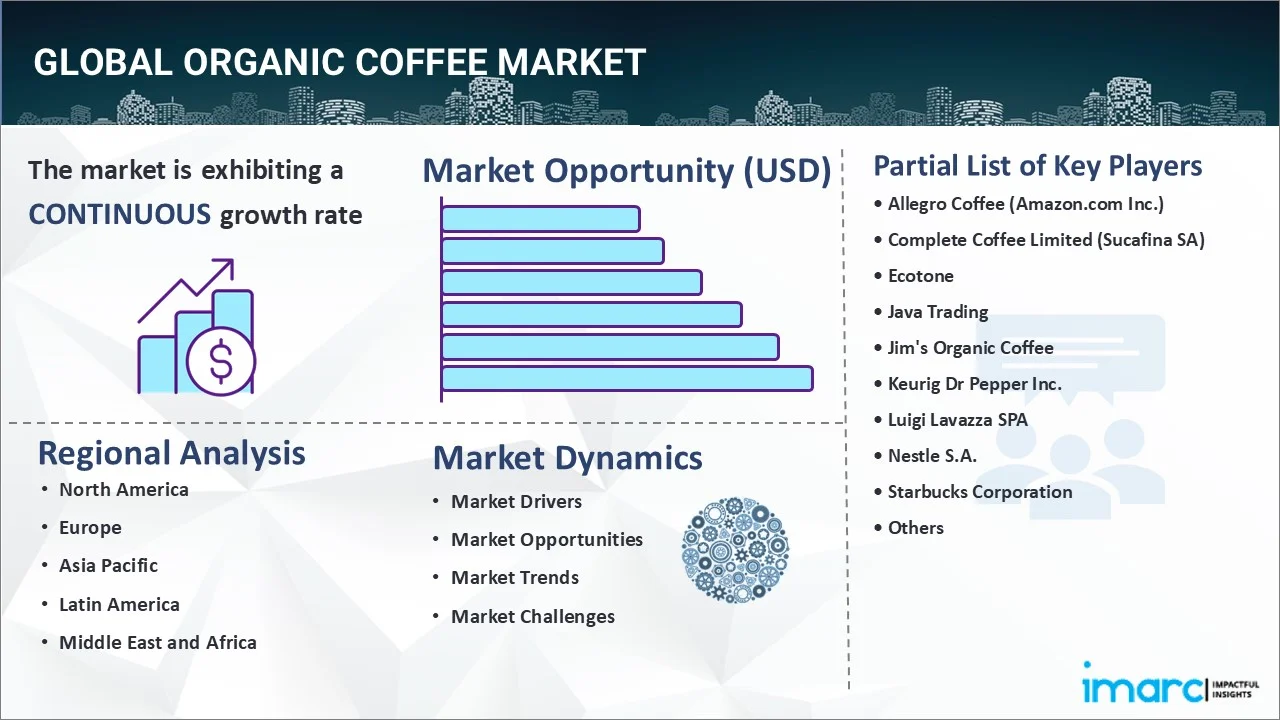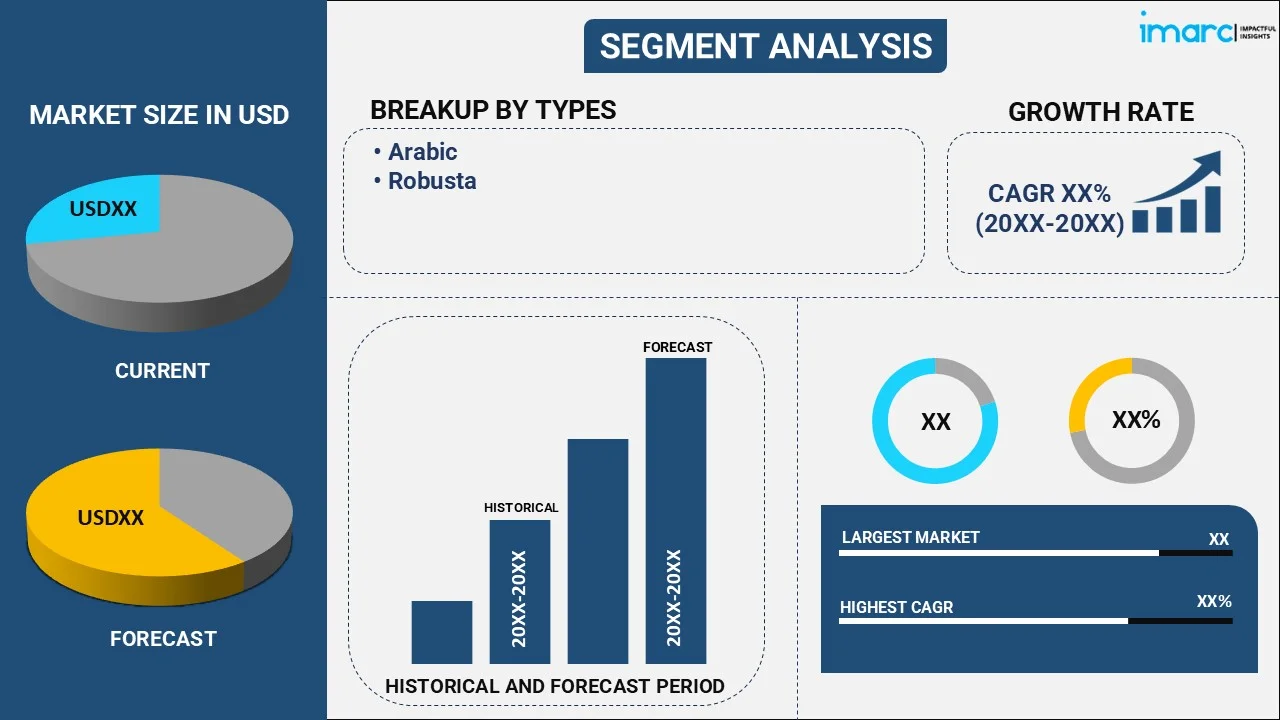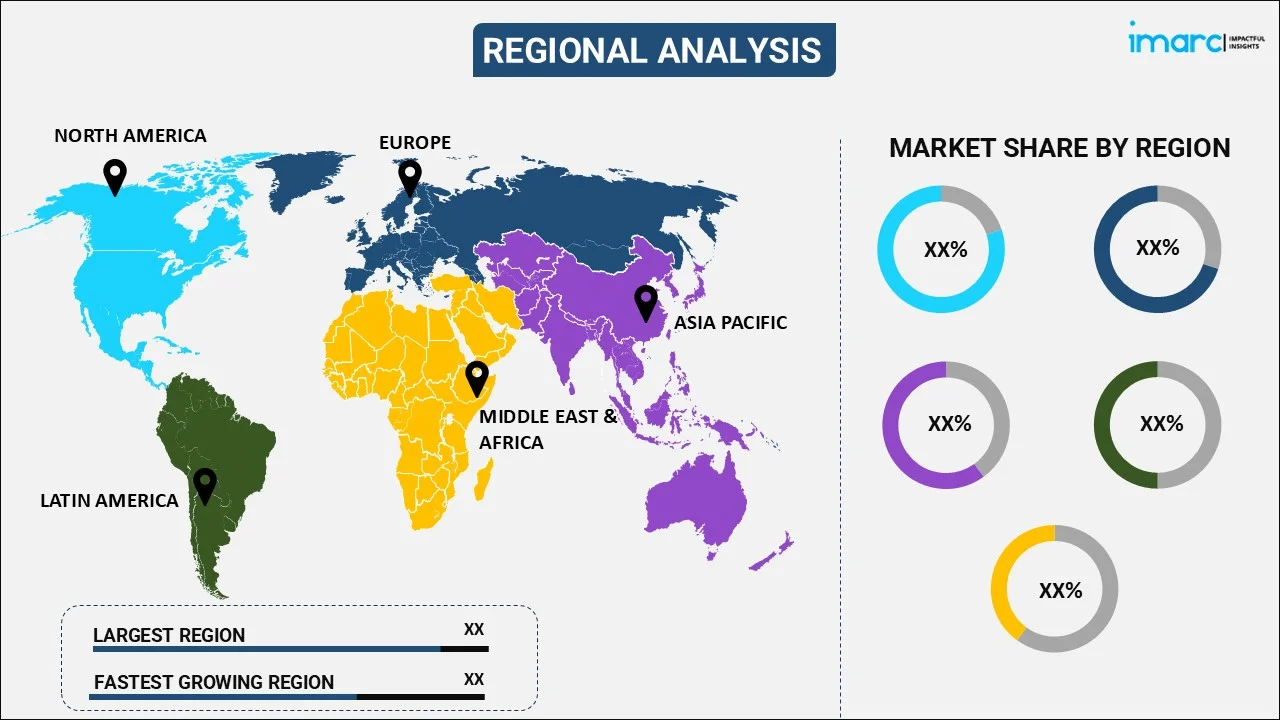
Organic Coffee Market Report by Type (Arabic, Robusta), Packaging Type (Stand-Up Pouches, Jars and Bottles, and Others), Sales Channel (Supermarkets and Hypermarkets, Convenience Stores, Specialty Stores, Online Stores, and Others), and Region 2025-2033
Organic Coffee Market Overview:
The global organic coffee market size reached USD 9.9 Billion in 2024. Looking forward, IMARC Group expects the market to reach USD 20.0 Billion by 2033, exhibiting a growth rate (CAGR) of 7.71% during 2025-2033. The growing health consciousness among individuals, increasing availability of new products, such as single-origin coffees, organic cold brews, and ready-to-drink (RTD) formats, and rising understanding about the environmental impact of conventional farming practices are some of the factors impelling the market growth.
|
Report Attribute
|
Key Statistics
|
|---|---|
|
Base Year
|
2024 |
|
Forecast Years
|
2025-2033
|
|
Historical Years
|
2019-2024
|
| Market Size in 2024 | USD 9.9 Billion |
| Market Forecast in 2033 | USD 20.0 Billion |
| Market Growth Rate (2025-2033) | 7.71% |
Organic Coffee Market Analysis:
- Major Market Drivers: The market is experiencing strong growth because of the increasing consumer demand for healthier and sustainable products. Additionally, the growing emphasis on environmental sustainability and ethical sourcing, such as fair-trade practices, are offering a favorable market outlook.
- Key Market Trends: The rise of specialty coffee culture, with a focus on premium, high-quality brewing experiences, is driving the demand for organic coffee. Besides this, the availability of products through online and retail channels is supporting the market growth.
- Geographical Trends: North America dominates the market because of high health-conscious consumer bases and the escalating demand for sustainable products.
- Competitive Landscape: Some of the major market players in the industry include Allegro Coffee (Amazon.com Inc.), Complete Coffee Limited (Sucafina SA), Ecotone, Java Trading, Jim's Organic Coffee, Keurig Dr Pepper Inc., Luigi Lavazza SPA, Nestle S.A., Starbucks Corporation, and The Kraft Heinz Company.
- Challenges and Opportunities: High manufacturing costs and the limited availability of organic farming resources are key challenges. However, the growing consumer demand for sustainable products and the expansion of ethical sourcing practices present growth opportunities.

Organic Coffee Market Trends:
Growing Health Awareness
Consumers are prioritizing their health, which is resulting in a notable shift toward organic products, including coffee. Organic coffee is regarded a healthier choice compared to conventional options because it is grown without the use of synthetic pesticides, fertilizers, or chemicals. This is in line with the increasing need for products with clean labels and eco-friendly characteristics. More people are seeking to lower their exposure to harmful substances, which is leading to higher demand for organic coffee, especially among younger, health-conscious demographics. Besides this, retailers and cafes are responding by increasing their offerings of organic coffee to meet this demand, making it more widely available. Sustainability initiatives and consumer demand for healthier, chemical-free products are key organic coffee market growth factors driving increased adoption. In 2023, Instill Coffee Co. launched its inaugural physical store in Cedar Park, Texas. The store offered organic coffee blended with adaptogens, such as ghee and turmeric, as well as specialty toasts.
Increasing Product Offerings
Companies in the coffee industry are expanding their product lines to include a wider variety of organic options. The availability of new products, such as single-origin coffees, organic cold brews, and ready-to-drink (RTD) formats, is propelling the market growth. Additionally, retailers are dedicating more shelf space to organic coffee, increasing its accessibility. The introduction of new flavors and innovative brewing methods also cater to the growing demand for specialty coffee products, enhancing the appeal of organic offerings. This product diversification is contributing to higher consumer engagement and expanding the market for organic coffee. In 2024, Chameleon Organic Coffee launched a new series of 8 oz. RTD cold-brew cans in four flavors, including nitro black, double espresso, sweetened black, and flat white. Each can offer a convenient, shelf-stable coffee option crafted with 100% organic beans, designed for consumers seeking high-quality coffee on the go.
Sustainability and Environmental Concerns
Individuals are becoming more conscious about the environmental effects of conventional farming practices and are seeking products that reflect their eco-friendly beliefs. Organic farming methods promote biodiversity, enhance soil health, and lower water pollution, making organic coffee a more sustainable option. The increasing focus on ethical consumerism is encouraging manufacturers to embrace organic certifications like United States Department of Agriculture (USDA) Organic and Fair Trade, appealing to eco-conscious individuals. In 2024, Muskoka Roastery launched three environment-friendly coffee items, including compostable black bear decaf pods, compostable AKI organic pods, and compostable organic espresso capsules. This range of products prioritizes eco-friendliness through fully compostable packaging and certifications like Rainforest Alliance and USDA Organic, demonstrating the company's dedication to quality and sustainability.
Organic Coffee Market Segmentation:
IMARC Group provides an analysis of the key trends in each segment of the market, along with forecasts at the global, regional, and country levels for 2025-2033. Our report has categorized the market based on type, packaging type, and sales channel.
Breakup by Type:

- Arabic
- Robusta
Arabic accounts for the majority of the market share
The report has provided a detailed breakup and analysis of the market based on the type. This includes Arabic and robusta. According to the report, Arabic represented the largest segment.
Arabic dominated the market because of its excellent flavor profile and popularity among high-end coffee drinkers. Arabica beans are recognized for their silky taste, reduced acidity, and intense fragrance, making them popular among specialty coffee companies and artisanal roasters. The extensive usage and excellent flavor profile contribute to the overall organic coffee market size, making it a dominant segment in the industry.
Breakup by Packaging Type:
- Stand-Up Pouches
- Jars and Bottles
- Others
Stand-up pouches hold the largest share of the industry
A detailed breakup and analysis of the market based on the packaging type have also been provided in the report. This includes stand-up pouches, jars and bottles, and others. According to the report, stand-up pouches accounted for the largest market share.
Stand-up pouches represent the largest segment because of their convenience, affordability, and eco-friendly attributes. These pouches are lightweight, easy to store, and offer excellent product protection, preserving the freshness and quality of organic coffee. In addition, stand-up pouches cater to the rising need for sustainable packaging by requiring less material than rigid options.
Breakup by Sales Channel:
- Supermarkets and Hypermarkets
- Convenience Stores
- Specialty Stores
- Online Stores
- Others
Supermarkets and hypermarkets represent the leading market segment
The report has provided a detailed breakup and analysis of the market based on the sales channel. This includes supermarkets and hypermarkets, convenience stores, specialty stores, online stores, and others. According to the report, supermarkets and hypermarkets represented the largest segment.
Supermarkets and hypermarkets hold the biggest market share, as they have extensive distribution networks and provide convenience to buyers. These large retailers offer a wide range of product displays, enabling buyers to easily compare different organic coffee brands and types in a single store. The growing preference for one-stop shopping and the availability of organic coffee at competitive prices make supermarkets and hypermarkets the go-to option for many individuals. Their dominance is also supported by the increasing demand for premium and sustainable products among mainstream shoppers.
Breakup by Region:

- North America
- United States
- Canada
- Asia-Pacific
- China
- Japan
- India
- South Korea
- Australia
- Indonesia
- Others
- Europe
- Germany
- France
- United Kingdom
- Italy
- Spain
- Russia
- Others
- Latin America
- Brazil
- Mexico
- Others
- Middle East and Africa
North America leads the market, accounting for the largest organic coffee market share
The report has also provided a comprehensive analysis of all the major regional markets, which include North America (the United States and Canada); Asia Pacific (China, Japan, India, South Korea, Australia, Indonesia, and others); Europe (Germany, France, the United Kingdom, Italy, Spain, Russia, and others); Latin America (Brazil, Mexico, and others); and the Middle East and Africa. According to the report, North America represents the largest regional market for organic coffee.
North America leads the market due to the growing health-conscious among individuals and rising demand for sustainable products. The existence of a strong coffee culture, where individuals prefer organic and fair-trade choices, is bolstering the market growth. Increasing awareness about the environmental impact of conventional farming practices and the health benefits of organic products are driving the organic coffee demand in this region. Moreover, the expansion of leading organic coffee labels and specialized coffee establishments is strengthening the market growth. In 2024, a new branch of Ambee Coffee Co. was established in Warren, New Jersey, providing organic coffee and tea exclusively. The store prioritizes sustainability by offering organic certified products and creating their own alternative milks. Founder Steven Chiocchi emphasizes thoughtful preparation and sustainable partnerships, with future plans to expand the menu and open a local roasting facility.
Competitive Landscape:
- The market research report has also provided a comprehensive analysis of the competitive landscape in the market. Detailed profiles of all major companies have also been provided. Some of the major market players in the industry include Allegro Coffee (Amazon.com Inc.), Complete Coffee Limited (Sucafina SA), Ecotone, Java Trading, Jim's Organic Coffee, Keurig Dr Pepper Inc., Luigi Lavazza SPA, Nestle S.A., Starbucks Corporation, The Kraft Heinz Company, etc.
(Please note that this is only a partial list of the key players, and the complete list is provided in the report.)
- Key players in the industry are concentrating on broadening their range of products to meet the increasing need for high-quality, environment-friendly coffee choices. They are incorporating sustainable practices like obtaining coffee through fair trade and organic farming methods to cater to consumer demand for ethical consumption. Furthermore, leading organic coffee companies are enhancing their presence in online and retail channels to reach a broader audience, while leveraging strategic partnerships and acquisitions to strengthen their market position. Many are also putting money into new packaging ideas that focus on both eco-friendliness and keeping products fresh. For instance, in 2024, Cambio Roasters launched aluminum coffee pods that are compatible with K-Cups, offering an eco-friendly option instead of plastic. These pods, crafted from endlessly recyclable aluminum, aid in decreasing plastic waste while maintaining the freshness of coffee. Cambio purchases exclusively organic coffee and gives 20% of its earnings to help farming families ensure food security with the Food 4 Farmers project.
Organic Coffee Market News:
- May 2024: Green Day launched “Punk Bunny Coffee” in partnership with Keurig Dr Pepper. The brand emphasizes organic, Fair Trade Certified coffee with a focus on sustainability and community.
- July 2024: Tarrazu Coffee Co. in Coconut Creek now offers organic coffee from Costa Rican farmers. The family-run coffee shop focuses on sustainability and freshness, providing an online menu for easier access to consumers.
- October 2023: Ecotone launched La Caféière, Europe's biggest fully organic coffee and tea factory, after investing ten million euros. The factory places a strong focus on sustainability by incorporating eco-friendly practices like reducing carbon emissions during roasting, utilizing green energy, and implementing a 100% circularity policy.
Organic Coffee Market Report Scope:
| Report Features | Details |
|---|---|
| Base Year of the Analysis | 2024 |
| Historical Period | 2019-2024 |
| Forecast Period | 2025-2033 |
| Units | Billion USD |
| Scope of the Report | Exploration of Historical Trends and Market Outlook, Industry Catalysts and Challenges, Segment-Wise Historical and Future Market Assessment:
|
| Types Covered | Arabic, Robusta |
| Packaging Types Covered | Stand-Up Pouches, Jars and Bottles, Others |
| Sales Channels Covered | Supermarkets and Hypermarkets, Convenience Stores, Specialty Stores, Online Stores, Others |
| Regions Covered | Asia Pacific, Europe, North America, Latin America, Middle East and Africa |
| Countries Covered | United States, Canada, Germany, France, United Kingdom, Italy, Spain, Russia, China, Japan, India, South Korea, Australia, Indonesia, Brazil, Mexico |
| Companies Covered | Allegro Coffee (Amazon.com Inc.), Complete Coffee Limited (Sucafina SA), Ecotone, Java Trading, Jim's Organic Coffee, Keurig Dr Pepper Inc., Luigi Lavazza SPA, Nestle S.A., Starbucks Corporation, The Kraft Heinz Company, etc. |
| Customization Scope | 10% Free Customization |
| Post-Sale Analyst Support | 10-12 Weeks |
| Delivery Format | PDF and Excel through Email (We can also provide the editable version of the report in PPT/Word format on special request) |
Key Benefits for Stakeholders:
- IMARC’s industry report offers a comprehensive quantitative analysis of various market segments, historical and current market trends, organic coffee market forecast, and dynamics of the market from 2019-2033.
- The research report provides the latest information on the market drivers, challenges, and opportunities in the global market.
- The study maps the leading, as well as the fastest-growing, regional markets. It further enables stakeholders to identify the key country-level markets within each region.
- Porter's five forces analysis assists stakeholders in assessing the impact of new entrants, competitive rivalry, supplier power, buyer power, and the threat of substitution. It helps stakeholders to analyze the level of competition within the organic coffee industry and its attractiveness.
- The competitive landscape allows stakeholders to understand their competitive environment and provides insight into the current positions of key players in the market.
Key Questions Answered in This Report
The global organic coffee market was valued at USD 9.9 Billion in 2024.
We expect the global organic coffee market to exhibit a CAGR of 7.71% during 2025-2033.
The rising demand for organic coffee as it aids to reduce the risk of cancer, lower cholesterol levels, boost immunity, facilitate weight loss, and prevent neurological diseases, is primarily driving the global organic coffee market.
The sudden outbreak of the COVID-19 pandemic has led to the changing consumer inclination from conventional brick-and-mortar distribution channels towards online retail platforms for the purchase of organic coffee.
Based on the type, the global organic coffee market can be segmented into Arabic and Robusta. Currently, Arabic holds the majority of the total market share.
Based on the packaging type, the global organic coffee market has been divided into stand-up pouches, jars and bottles, and others. Among these, stand-up pouches currently exhibit a clear dominance in the market.
Based on the sales channel, the global organic coffee market can be categorized into supermarkets and hypermarkets, convenience stores, specialty stores, online stores, and others. Currently, supermarkets and hypermarkets account for the largest market share.
On a regional level, the market has been classified into North America, Asia-Pacific, Europe, Latin America, and Middle East and Africa, where North America currently dominates the global market.
Some of the major players in the global organic coffee market include Allegro Coffee (Amazon.com Inc.), Complete Coffee Limited (Sucafina SA), Ecotone, Java Trading, Jim's Organic Coffee, Keurig Dr Pepper Inc., Luigi Lavazza SPA, Nestle S.A., Starbucks Corporation, and The Kraft Heinz Company.
Need more help?
- Speak to our experienced analysts for insights on the current market scenarios.
- Include additional segments and countries to customize the report as per your requirement.
- Gain an unparalleled competitive advantage in your domain by understanding how to utilize the report and positively impacting your operations and revenue.
- For further assistance, please connect with our analysts.
 Request Customization
Request Customization
 Speak to an Analyst
Speak to an Analyst
 Request Brochure
Request Brochure
 Inquire Before Buying
Inquire Before Buying




.webp)




.webp)












